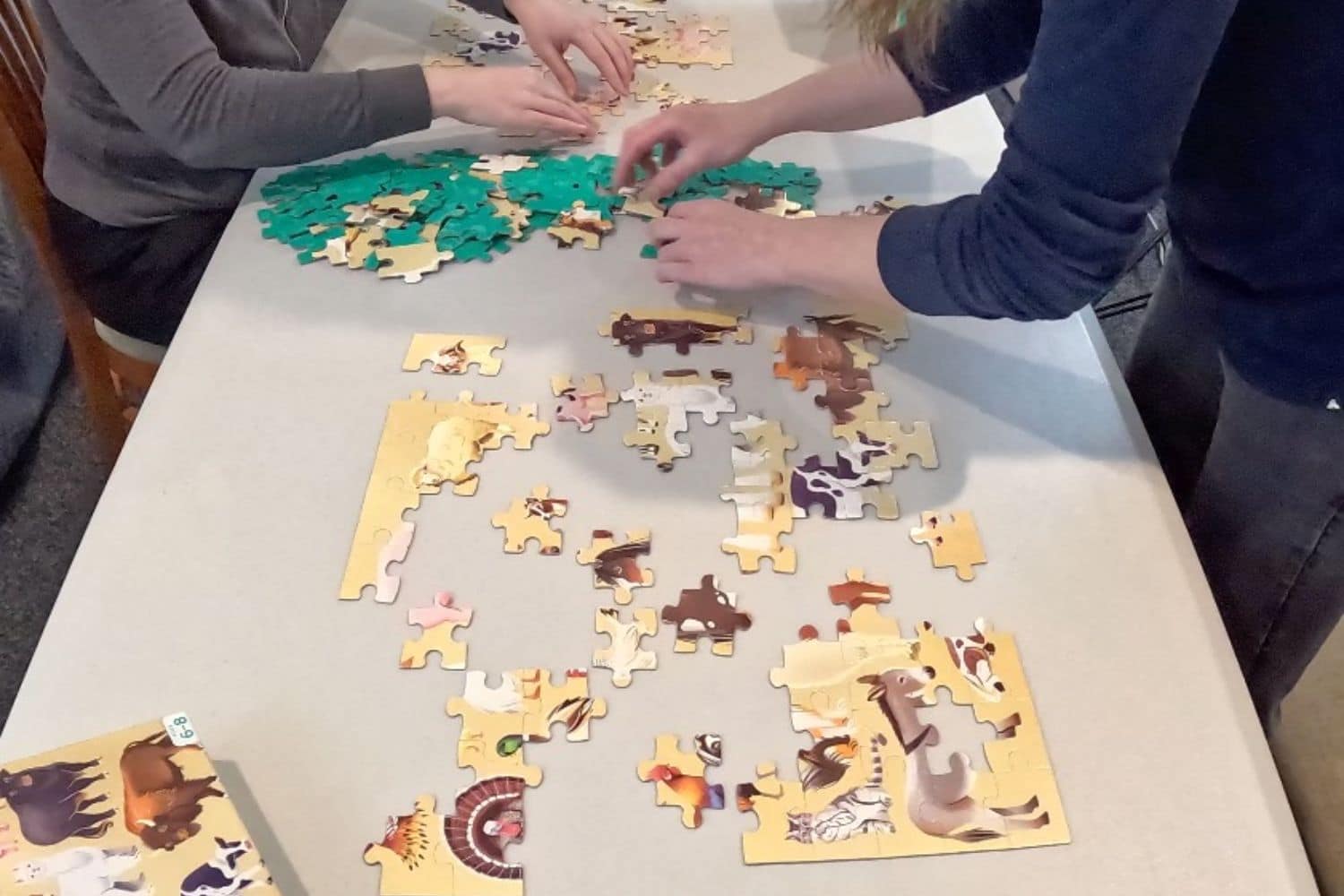Do jigsaw puzzles offer more than just leisurely fun? Are jigsaw puzzles a waste of time? Dive into this article to explore the potential mental, emotional, and physical rewards that jigsaw puzzles can provide.
Are Jigsaw Puzzles a Waste of Time?
Are jigsaw puzzles a waste of time or are they beneficial to your mental and emotional wellbeing? This has been an ongoing debate for years, with many people strongly on both sides.
Jigsaw puzzles can provide hours of enjoyable entertainment, yet some view them as being nothing but a distraction from more meaningful activities.
In this blog post, we’ll discuss the pros and cons of a jigsaw puzzle so that you can decide whether spending your time piecing together hundreds (or even thousands!) of tiny pieces is worth it.
With our analysis, you’ll have all the information needed to make an informed decision about why or why not jigsaws are right for you.
Mind Exercise
When you sit down to solve a jigsaw puzzle, your mind is put to work. You must use logic, problem-solving skills, and spatial reasoning to piece together the different shapes and colors. This mental exercise can improve cognitive function and memory, making it a valuable activity for people of all ages.
Stress Relief
In today’s fast-paced world, stress levels are at an all-time high. Jigsaw puzzles have been found to reduce anxiety and promote relaxation by diverting your mind away from negative thoughts and onto a singular, enjoyable task.
Family Bonding
Jigsaw puzzles can bring people together and strengthen family bonds. As you work together to solve the puzzle, you’ll communicate, collaborate, and encourage one another. This activity can also be a great way to connect with children and teach them valuable skills.
Prolonging attention span
In a world full of constant distractions, jigsaw puzzles can help improve concentration and focus. As you work on a puzzle, you must pay attention to every detail and piece to complete it. This helps train your brain to stay focused for longer periods.
Creative Outlet
Jigsaw puzzles also provide a creative outlet for those who enjoy art or design. With so many different designs and themes available, there is something for everyone to enjoy. Plus, once the puzzle is completed, you have a beautiful piece of artwork to display.
Training the eyes
Jigsaw puzzles require you to constantly scan and shift your eyes from one piece to another. This eye movement can help improve visual perception and strengthen eye muscles, making it a great activity for those who suffer from eye strain or other visual impairments.
Fine Motor Skills
The act of picking up and placing puzzle pieces requires fine motor skills, which can be beneficial for both children and adults. This activity can improve hand-eye coordination and strengthen finger muscles.
Life Lessons Learned
Jigsaw puzzles can teach valuable life lessons such as patience, perseverance, and problem-solving skills. These skills are essential for success in both personal and professional life and can be honed through the simple act of solving a puzzle.
Feeling of accomplishment
Completing a jigsaw puzzle can give you a sense of accomplishment and satisfaction. Seeing all the pieces come together to form a beautiful image can bring about a feeling of pride and boost self-esteem.
It’s fun and rewarding
Last but not least, jigsaw puzzles are simply fun! The satisfaction of completing a challenging puzzle can provide a sense of accomplishment and pride. It’s also a great way to pass the time, whether you’re alone or with friends and family.
Reasons Jigsaw Puzzles May Be Considered a Waste of Time
Time-Consuming
One argument against jigsaw puzzles is that they can be time-consuming and take away from more productive tasks. Some may feel guilty for spending hours on a puzzle when they could be doing something more “productive.”
Frustration
Jigsaw puzzles can also be frustrating, especially for those who do not enjoy the challenge or struggle to find certain pieces. This frustration can lead to a negative outlook on the activity and make it seem like a waste of time.
Lack of Variety
While jigsaw puzzles can offer hours of entertainment, some argue that it’s a repetitive and monotonous activity. Once you’ve completed one puzzle, the experience is likely to be similar for all future puzzles. This lack of variety can lead to boredom and a sense of wasted time.
Limited Physical Benefits
Unlike other hobbies or activities, jigsaw puzzles don’t offer much in terms of physical exercise. While it may help improve fine motor skills and hand-eye coordination, it’s not a substitute for regular physical activity.
Conclusion – Are Jigsaw Puzzles a Waste of Time?
So, are jigsaw puzzles a waste of time? The answer is subjective and ultimately depends on the individual’s perspective and goals. While there are valid arguments on both sides, it’s clear that jigsaw puzzles offer numerous mental, emotional, and even physical benefits.
So the next time you sit down to solve a puzzle, remember that you’re not just wasting time – you’re working out your brain, relieving stress, bonding with loved ones, and possibly even learning important life lessons.
Whether or not jigsaw puzzles are a waste of time is up to you to decide, but the evidence suggests that they can be a valuable and rewarding activity for both children and adults. Happy puzzling!
Thanks for reading our article. If you want to know more information, visit our website here.
Read more:


